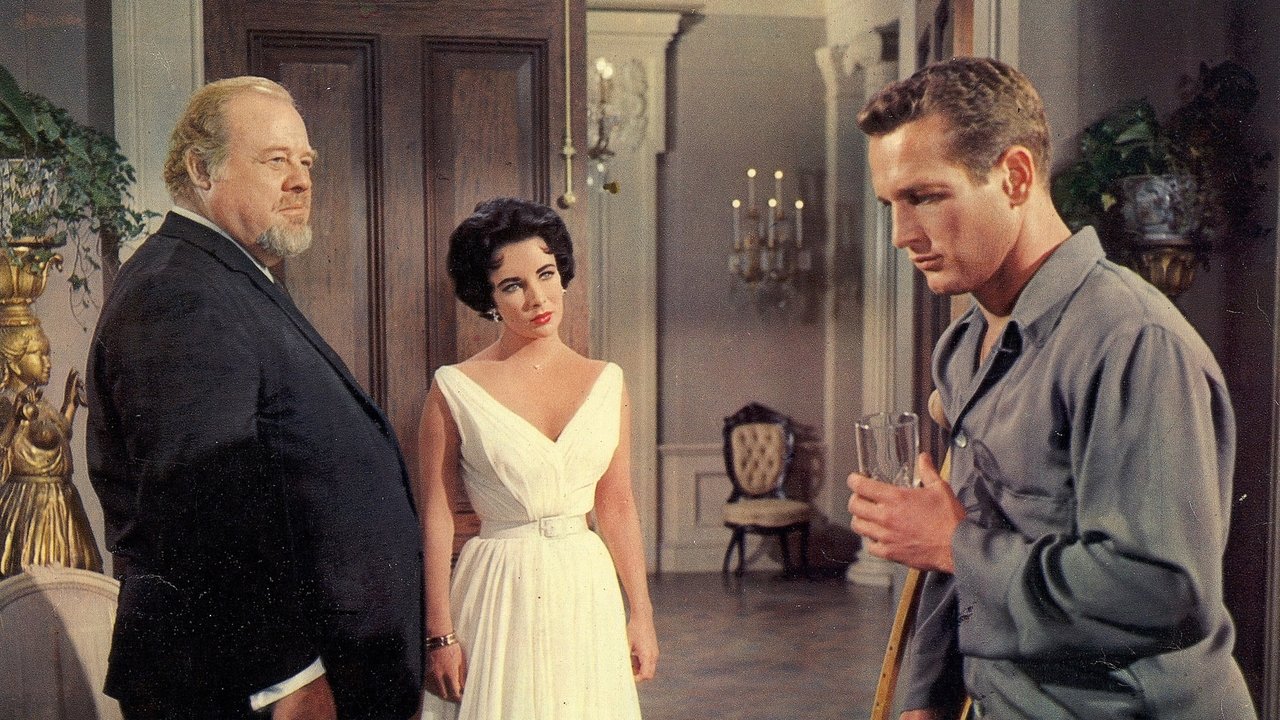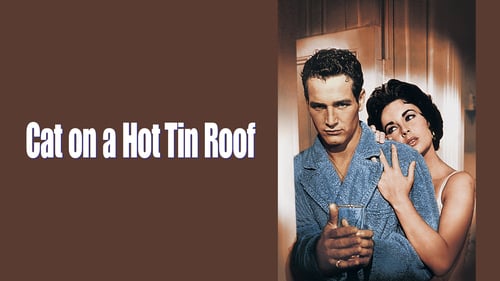



The greatest movie ever made..!
Brilliant and touching
I am only giving this movie a 1 for the great cast, though I can't imagine what any of them were thinking. This movie was horrible
View MoreA story that's too fascinating to pass by...
Tennessee Williams are so hard to watch. There are always tormented characters, failure, insensitivity, and lust. The inimitable Burl Ives plays Big Daddy, the patriarch, who is dying, though he doesn't know it for sure. Paul Newman is the son who has never connected with him; actually, there is great hatred for him. His wife is Elizabeth Taylor, Maggie the Cat, who is stunning, of course. This revolves around a birthday party for Big Daddy where the other son and his whiny wife and their kids are circling like vultures, trying to get the entire estate when Big Daddy dies. Brick, Newman's character, is a drunk and walks around with a cast because his foolish actions caused him to break his leg. Of course, the story revolves around the in-fighting plus getting at the root of Brick's anger toward his father. When this is revealed, it creates a final confrontation between the two stiff backed men. Quite a remarkable movie. Ives is a consummate actor and it's interesting how few film roles he had. This is undoubtedly his best.
View MoreThere's a certain feel and boldness to this story that makes us simply sure we're talking about another wonderful work by Tennessee Williams. When I started watching the film, I had no idea it was based on his play, later on when I found out, it made total sense. He always seems to treat taboo questions in a very open and artistic manner (in a similar way to "A Streetcar Named Desire"). This one deals with a very strong patriarch figure inside the family, "Big Daddy" Pollitt, it's not only a pet name, it's also an indicative of his size and place inside the family tree. And he is a hard-headed figure, who imposes his opinions no matter what, a question of obeying the law.The main affected by this tyranny seems to be Paul Newman's character, Brick Pollitt. We meet him as a recovering alcoholic and ex-football player, in a most iconic scene beside Elizabeth Taylor. From the first moment we learn he has some kind of animosity towards his perfectly beautiful wife, the sexual undertones are present at all times. It's instigating, why shouldn't any perfectly normal and handsome husband feel sexually attracted to his perfectly beautiful wife? Hence the genius name of the movie, she feels like a cat on a hot tin roof. Those questions are soon brought to us through Big Daddy's (and the rest of the family) interference in their relationship. The scenes where he and Brick discuss over the motives for his bitterness over life are simply amazing. There's a mixture of sexual frustration, paternal repression, and some level of homosexual affection going on. There's also Big Daddy's health condition, he seems to be ill and his prognosis not so good. Brick in a way wishes him to die, at times it seems like that's the only way he could ever grab domain of his own life again.Although waved to us, full answers are never given (especially the nature of Brick's relationship with his late friend, plus Maggie's involvement in it), because we only have access to a small fraction of that family's feuds, when the (never harmonious) system is already in decadence. The end features an interesting turn of events, the father and son conflict finds some kind of relief, perhaps in the light of nostalgia and death approaching. And so does Brick's relationship with Maggie, the cat, the last scene boasts with lust as we watch their reconciliation as Paul Newman delivers the line: "Maggie, we're through with lies and liars in this house. Lock the door."
View More"Cat on a Hot Tin Roof is a 1958 American drama film directed by Richard Brooks. It is based on the Pulitzer Prize-winning play of the same name by Tennessee Williams adapted by Richard Brooks and James Poe."(Wikipedia)Elizabeth Taylor gives her best performance in the role as Maggie the cat, in Cat on a Hot Tin Roof playing opposite Paul Newman, who plays Brick, an alcoholic, in the closet gay. This Tennessee William's play adaptation shows Taylor and Newman's sure power on the screen. The contrast between Elizabeth Taylor's and Paul Newman's eyes is the magical spark that inflames the audience. After the tragedy of Mike Todd's death left an ever showing scar on the newly widowed Elizabeth Taylor, which in turn her sadness and melancholy is shown through her passion for Brick as she tries various ways to seduce the man who she once thought loved her. The secretiveness about homosexuality is curiously brought out through the eyes of Tennessee Williams as well, and is played out perfectly by the Taylor/Newman duo. The rage and missing passion that is seen in Elizabeth Taylor's face will strike the very heart of you and grip you into this tussle between husband and wife. This film is almost foreshadowing to "Who's Afraid of Virginia Woolf?" which was released later in the 60's. For any fan of either Tennessee William's, Elizabeth Taylor, or Paul Newman, or just a great performance, this is a great addition to your collection. As Elizabeth Taylor gained her fame to the top of Hollywood royalty, her marriage to Michael Wilding went into turmoil. Elizabeth Taylor basically sought solitude and a safe haven to have children and found that in Wilding. However, as Taylor soared, Wilding's career deflated, which sparked arguments and later led to the couples divorce. Elizabeth Taylor found the love of her life; producer Mike Todd. The two were seen everywhere, toting fabulous jewels such as her famous tiara, as well as Bulgari necklaces and earrings and other noted gems in which Todd expressed his love for Taylor. As Mike Todd's "Around the World in 80 Days" hit the screen, so did the couples romance. As a wedding gift and honeymoon, Todd took Taylor on a worldwide tour promoting the film. Internationally the couple gained mass attention, creating crowds wherever they went. Newspapers and tabloids were constantly spreading gossip and creating the attention for them. Unfortunately Todd boarded his plane for New York named "The Lucky Liz", while Taylor stayed at home with the stomach flu. Mid-flight the plane failed and Todd and the other occupants all were killed. As soon as the news filtered to Taylor, she went into a tantrum and drank heavily from devastation. Taylor was divorced twice and a widow at the age of 26. Soon after the tragedy, Elizabeth Taylor began the final scenes of "Cat On a Hot Tin Roof". Some speculated whether or not Taylor was going to even step foot onto the set, because of locking herself into confinement for multiple weeks after Todd's death. Yet, contrary to rumors, Elizabeth Taylor gave one of the best performances of her career. Elizabeth Taylor gave intense anger and sadness that stemmed from tragedy. As a great actress, Taylor funneled her feelings into "Maggie the cat", which intensified her role in the Tennessee Williams play. At first the people behind the production of "Cat On a Hot Tin Roof" wanted to make the film in black and white, yet after criticism decided to film it in color. Many said that they would be fools to miss the opportunity to capture Elizabeth Taylor and Paul Newman's eyes, because of the craze that was behind them. Paul Newman's eyes were crystal blue and could seduce a woman easily just from a glance, and Elizabeth Taylor's eyes were violet and captured the hearts of men across the world. This film would be a great addition to your collection because it captures some of the best performances of the cast's lives. Heart racing scenes and troubling arguments create a feeling of uneasiness that settles into the hearts of its viewers. In addition to that, you also get a look into some of the history of Hollywood as the secretiveness of homosexuality that is confided into the men of the silver screen. Any fan of great plots as well as great acting would surely appreciate adding this film to their watch list.
View MoreI tend to be a bit suspicious of pictures that came to our shores after a great deal of overseas pre-release ballyhoo. True, movies like "Cat on a Hot Tin Roof" did take in a wonderful amount of money, but usually not enough to match their domestic gross or land them in our top twenty. Word-of-mouth usually turned against these movies too. Whilst they often chalked up respectable city seasons, they usually died in the suburbs and ended up playing to empty houses in rural areas. My latest estimate: Boring. A few sexual references may have titillated patrons in 1959, but they certainly don't keep this dreary, photographed-stage-play alive more than fifty years later. Despite sterling efforts by most of the players, "Cat on a Hot Tin Roof" emerges as a dull, slow-moving picture, peopled with dull, painstakingly torpid caricatures mouthing dull, tediously uninteresting dialogue. We don't care a hoot why Newman isn't shacking up with Taylor. She's such a relentlessly brow-beating, yakkety-yakking shrew, we don't blame him for taking refuge in the bottle.The photographer tries hard to make Liz look glamorous, but he has his work cut out for him. Brooks' relentlessly routine direction with its monotonous parade of gormless close-ups doesn't help either. Nor do the very limited production values perk up any interest. Except for a few minutes of location filming, this picture is unadventurously tied to the Hollywood sound stage. The movie's theatre origins are also all too obvious. And then, to add insult to injury, what M-G-M has done is to take the guts right out of it. Symbolism is used with all the subtlety of a meat cleaver. Music is no asset either. The composer missed a grand opportunity to send the whole thing up by playing "That Old Feeling" under Taylor's constant whinges and "Ida" under Anderson's melodramatics.Finally, the ending. After Newman's endless talk of the sins of "mendacity" (don't worry, the word is defined for the benefit of those picturegoers who are not walking dictionaries), this ridiculous, negating-everything-that-has-gone-before-cop-out of a conclusion really puts the lid on this Cat.
View More